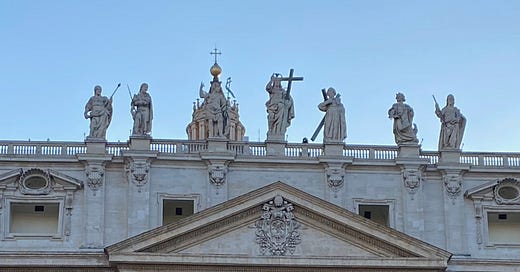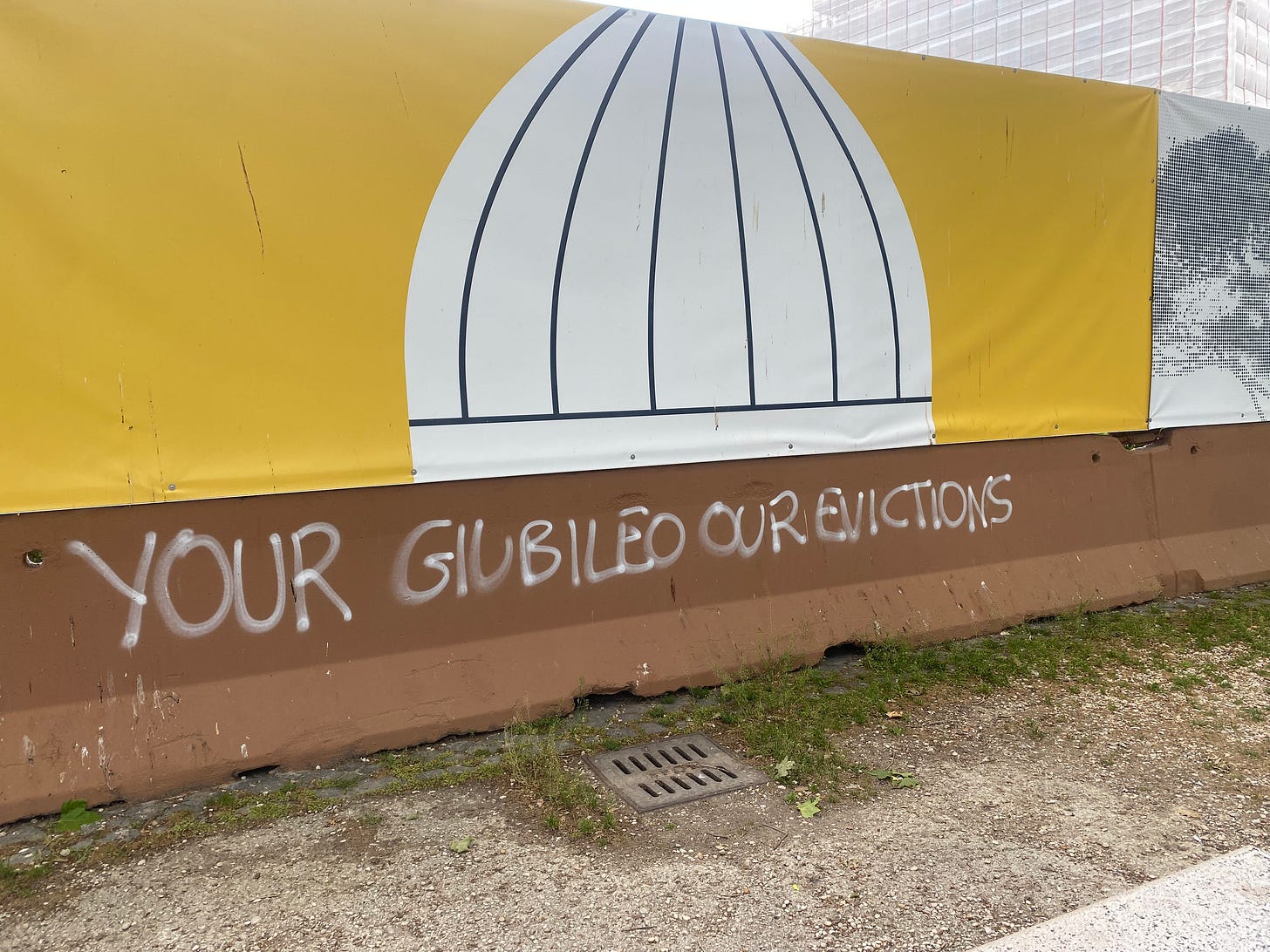Of New Things: Roundtable Reports on Pope Leo XIV from St. Peter's Square
Renée Roden writes from Rome about the first North American Cardinal, Robert Prevost, becoming the 267th Bishop of Rome
VATICAN CITY — At 6:08 PM Rome time, on the third vote of the conclave, white smoke poured out of the chimney of the Sistine Chapel.
Shouts, cheers, and cries of “papa!” erupted throughout St. Peter’s Square.
I arrived in Rome just a little over 36 hours before then. And, in true Catholic Worker fashion, did not know where I was going to sleep that night when I landed at Fiumicino Airport. By the time I left the airport, however, a few friends (old and new) in the Focolare movement had made a series of connections that led to an open room at the Ukrainian Pontifical College of Saint Josaphat.
Precarity is an essential part of poverty, as Dorothy Day wrote in 1952. Involuntary precarity, like the poverty Day calls destitution, is often crafted by human hands, the result of greed and injustice. But precarity—whether voluntary or involuntary—often creates the conditions for beautiful acts of hospitality. Hospitality in the midst of precarity feels like a miracle.
At the Ukrainian College, the seminarians invited me to breakfast after morning liturgy on Thursday—another act of hospitality. I was not the only guest at breakfast: Metropolitan Borys Gudziak, the Metropolitan-Archbishop of Philadelphia, and head of the Ukrainian Catholic Church in the United States was also visiting for the conclave and talking with several priests a few tables over.
At breakfast, the seminarians and I spoke about the communiqué the Cardinals published on Monday from their General Congregation, in which they called for peace in Gaza and Ukraine.
In that statement, the Cardinals noted,
with regret that there has been no progress in advancing the peace processes in Ukraine, the Middle East and so many other parts of the world, and that on the contrary, attacks have intensified, especially against the civilian population, make a heartfelt appeal to all parties involved to reach a permanent ceasefire as soon as possible and to negotiate, without preconditions and further delay, the peace long desired by the peoples involved and by the entire world
The Ukrainian seminarians’ time in Rome has been deeply disturbed by the war over the past three years. Some of the older seminarians, who came to Rome before Russia invaded, had not returned home to Ukraine in four years.
War has made getting student visas more complicated and difficult, as all Ukrainian men ages 18 to 60 are supposed to remain in Ukraine. Younger seminarians, who had applied for their student visas during wartime, were required to return home every three months.
Another woman in St. Peter’s Square told me of encountering a Ukrainian refugee in a town outside Rome with a four-year-old son. The woman had packed her car and driven all the way down to Italy, forced to leave her conscription-age husband behind. She told her son it was all a game: daddy was waiting for them and they would return home soon.
Despite the calls for peace, war, the cost of war, and the violence of our society lingered on the edges of the joyful and hopeful atmosphere of the conclave.
As the crowds streamed out of the square, after the smoke cleared out of the chimney, other groups of men and women quietly set up their tents, sleeping bags, and cardboard boxes, and settled in to sleep for the night.
When I was leaving the press office, several men and women began setting up their beds around the Sala Stampa. “Excuse me, I’m so sorry,” a man said to me, gesturing to his bed. His name was Francesco, he said. Like the lover of poverty and the pope who just died, I thought. He had lost his house recently and was now sleeping in front of the Vatican press office.
The 2025 Jubilee Year is expected to draw more than 30 million pilgrims to Rome this year. Monasteries and convents were already filled before the funeral of Pope Francis drew close to half a million attendees. The events of the Jubilee Year is estimated to reduce the supply of rentals in Rome and drive up short and medium-term rental prices by 17%, according to The Globalist. In 2023, 3,528 eviction orders were issued in Rome, many for failure to pay rent, according to Il Messagero.
After hundreds of Romans were forcibly evicted during the 2015 Special Year of Mercy, a moratorium on forced evictions was proposed for the Jubilee Year of Mercy by the Cardinal of Rome.
As I walked back to the Ukrainian College that night, I passed lines of tents circling the colonnade of St. Peter’s Square. I thought of the nice, quiet room and soft bed I was walking toward. I thought of the brief moment of panic I had felt in Newark Airport before boarding a plane without a plan set in place. I thought that was precarity? This is precarity. I could have slept in the square, surrounded by the Son of Man who had nowhere to lay his head. I considered what Francesco would have done.
Shortly before 7:30 pm on Thursday, Cardinal Dominique Mamberti came onto the balcony to announce “Habemus Papam,” to the 150,000 people ABC reported were in the square. When the cardinal shared the new pope’s name— Cardinal Robert Francis Prevost—a ripple of cheers and roar of confusion roiled through the crowd. Who was Prevost?
Several jaws hit the square’s stone pavement when they heard he was an American citizen. A Peruvian woman standing near me did not know the new pope’s connection to Peru—he is a dual citizen—until Leo XIV began speaking in Spanish during his Urbi et Orbi address, thanking his former diocese in Chiclayo, Peru. She cheered.
The new pope’s chosen name, Leo XIV, instantly evoked his predecessor, Leo XIII, the pope of Catholic Social Teaching. Scholars refer to Leo XII’s Rerum Novarum— “On the Rights and Duties of Capital and Labor”—as the first Catholic Social Teaching encyclical.
The Catholic Worker mentioned Leo XII’s “great” encyclical, Rerum Novarum, more than 50 times in its first decade of publishing. In 1932, a column in The Catholic Worker said of Rerum Novarum:
There is no more searching analysis of the evils in modern economic society, and it seems to me to be a much more revolutionary document than the Communist Manifesto; for it strikes the root causes of social disorder, and. if applied, its principles would universally pluck them out. Let any man who foolishly thinks the Church to be the conservative ally of things as they are, no matter how bad they are, read Leo's doctrine.
“He’s for the Catholic Worker, this pope!” an Australian man standing near by told me after hearing the name.
Prevost ministered in Peru for nearly two decades in total. He became a citizen of Peru in 2015, when he returned to Peru to serve as bishop of Chiclayo until his appointment to become the prefect of the Dicastery of Bishops in 2023. During his Urbi et Orbi address—to the city of Rome and the world—he thanked his former flock for their accompaniment, sharing their faith, and their generosity.
Pope Francis wrote movingly of his own family’s migrant background in his 2025 autobiography Hope. As a shepherd in the global south, the new Pope Leo XIV’s time in Peru seems to offer him perhaps a similar insight into the global phenomenon of migration, which Francis called a lamentable “sign of the times,” a phenomenon spurred by war and by nations enriching themselves on preparing for war, by climate devastation, by devaluing laborers and their work, and by fomenting class warfare by gouging a chasm of inequality between owners and workers.
Perhaps, as Pope Leo XIV takes up the name of the great pope of Catholic Social Teaching—and of Leo the Great, who prevented war by persuading Attila the Hun not to invade Italy—he will become that sower of peace the cardinals proclaimed was so desperately needed in the world and he will continue to be the pastor from and of migrants that Pope Francis strove to be.
“We want to be a synodal Church, a Church that walks, a Church that always seeks peace, that always seeks charity, that always tries to be close especially to those who suffer,” Leo XIV said in his Urbi et Orbi address. He repeated the need for the church to dialogue, build bridges, and unite people in peace.
“Thanks to Pope Francis!” he added, sparking loud cheers. Leo XIV was already showing an insistence on unity and bridge-building by reaching out to the many different divisions in the church: wearing the traditional liturgical papal garments, the mozzetta, which Francis eschewed, while emphasizing encounter, synodality, and a special mission to reach those who suffer.
“We still keep in our ears that weak but ever courageous voice of Pope Francis blessing Rome! The Pope who blessed Rome gave his blessing to the world, to the entire world, that morning of Easter Day,” he said.
Several Romans mentioned they were still reeling from the loss of Pope Francis: it was a sudden loss after a seemingly hopeful Easter Sunday, when he gave his blessing to the world and greeted the crowds in the square. Pope Leo XIV’s gesture of invoking the legacy of Pope Francis, acknowledging his memory and the freshness of the loss, struck a comforting pastoral chord with many.
Walking back to the Ukrainian College, as fireworks were going off, and the cheering and celebration continued, I passed the queues of tents replacing the lines of pilgrims around St. Peter’s Square.
It is too easy, in our slick, fast digital world, to forget the poor: they are analog. They create friction. So they are more easily ignored on the sidelines.
I said a small prayer that those on the margins, even in the margins here in the very heart of the church in Rome—like those men and women in those tents—would remain at the center of this pope’s heart, his flock, and his papacy.
About us. Roundtable is a publication of catholicworker.org that covers the Catholic Worker Movement.
Roundtable is independent of the New York Catholic Worker or The Catholic Worker newspaper. This issue was produced by Renée Roden. Send inquiries to roundtable@catholicworker.org.
Subscription management. Add CW Reads, our long-read edition, by managing your subscription here. Need to unsubscribe? Use the link at the bottom of this email. Need to cancel your paid subscription? Find out how here. Gift subscriptions can be purchased here.
Paid subscriptions. Paid subscriptions are entirely optional; free subscribers receive all the benefits that paid subscribers receive. Paid subscriptions fund our work and cover operating expenses. If you would like to stop seeing Substack’s prompt to upgrade to a paid subscription, please email roundtable@catholicworker.org.







